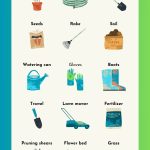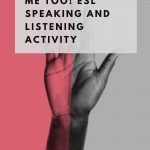Science is one of the most important subjects kids learn at school. We want to make sure that ESL students can have fun learning science while using English. Our top 10 ESL science games and activities for kids will help teachers and students have an awesome time learning various concepts and vocabulary of science.
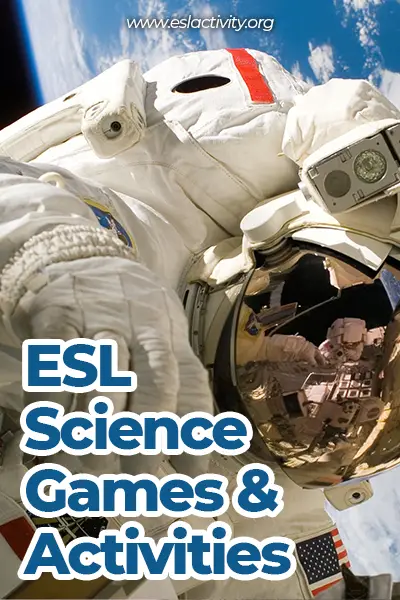
ESL Science Games and Activities for Kids
Here are the top 10 science games for kids. Some of the games are interactive activities that require some level of prep before class. But we tried our best to keep these ESL science games as simple as possible to make it easier for both teachers and students!
#1 Science Vocabulary Bingo
Transform vocabulary acquisition into a fun game of Word Bingo where students actively participate, identify scientific terms, and enhance their understanding.
#2 Science Charades
Combine language expression and scientific concepts with a riveting game of Science Charades. Watch as students act out scientific terms, reinforcing both verbal and non-verbal communication skills.
#3 Sink or Float
For this science game, you’ll need a basin of water and some simple objects (e.g., paper, feather, small toy, ping pong ball, piece of wood, plastic utensil). Ask your students to make a guess if the object will float or sink. They should also defend their predictions. To check out the answer, drop the object into the water. Let the class observe the result; repeat the process for all of the objects.
#4 Food Chain Puzzle: Science Games
First, you want to make sure students understand the concept of the ecosystem and the food chain. Print out pictures of the different stages of a food chain. You can make several sets of different habitats. Cut out each stage and mix them around. Students have to figure out the order of the food chain in order to complete the puzzle.
#5 Science Jeopardy
Inject an element of friendly competition into the learning environment with Science Jeopardy. This game not only tests knowledge but also promotes collaborative learning, enhancing both language and science proficiency in an engaging format.
#6 Science Trivia Quiz
Create a buzz in the classroom with our Science Trivia Quiz. This not only reinforces scientific knowledge but also challenges kids to articulate their answers in English, creating a dynamic learning environment that promotes both language and cognitive development.
#7 Tactile Guessing Game
For this game, you’ll need objects and a box or bag to hide the objects. Try to prepare a good mix of small, big, rough, soft, wet, and dry items. One student will put their hand in the box or bag and describe how it feels. The rest of the class has to try to figure out what the object is. Make sure students take turns and have the chance to feel and describe the object. This science game helps with language development as well as discussing various scientific properties.
#8 Static Electricity Balloon Activity
This activity is a great way to learn how static electricity works. You’ll need two things: balloons and glitter. We also recommend covering up the desk with something that will make it easier to clean up after you’re done. Give each student a balloon and ask them to rub it on their hair. Then, hold the balloon above the glitter. Make sure they don’t go too close and touch the glitter with the balloon! You’ll see the glitter jump and stick to the balloon.
#9 Storytelling Galaxy
Ask students to create imaginative stories incorporating scientific concepts. Emphasize the integration of vocabulary and accurate usage within the narrative. This game fosters creativity, language development, and a deeper grasp of scientific themes. You can make this into an individual writing activity or a group storytelling activity. If you decide it make it a group work, encourage students to collaboratively craft a story that revolves around the chosen scientific idea.
#10 Online Science Games
If you are using technology in your class, you can try playing computer Science games with your students. National Geographic Kids and Science Kids offer a wide range of fun and simple online science games.
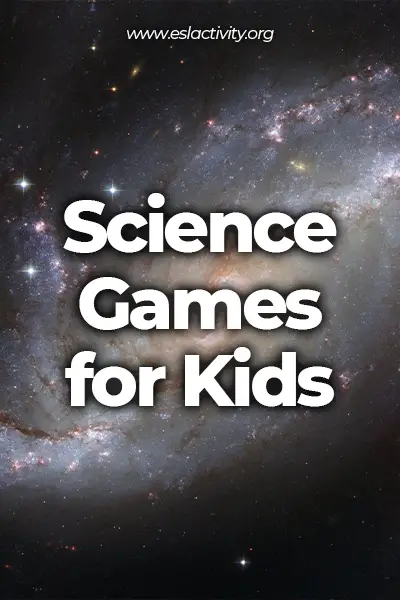
FAQs About ESL Science Games
Here are some of the most frequently asked questions about science games and activities for kids.
How do you teach science through games?
Teaching science through games is an engaging and effective approach. Here are steps to incorporate games into science lessons: identify key concepts, select appropriate games, incorporate hands-on activities, create a game plan, and encourage discussion.
How do you teach science in a fun way?
Making science enjoyable involves infusing lessons with elements of fun and curiosity. Utilize hands-on experiments and incorporate visual aids such as diagrams or videos. Gamification, through the introduction of educational games and quizzes, can also transform the learning environment into a playful and engaging experience. Additionally, storytelling can be a powerful tool to connect scientific concepts with students’ imaginations, fostering both enjoyment and comprehension.
What are some good science activities for ESL students?
Here are some good science games and activities for ESL students:
- Science vocabulary bingo
- Science charades
- Sink or float
- Food chain puzzle
- Science Jeopardy
- Science trivia quiz
- Tactile guessing game
- Static electricity balloon activity
- Storytelling galaxy
- Online science games
How do you start an ESL science lesson?
To start an ESL science lesson, engage students with a stimulating question, video, or hands-on demo. Clearly state lesson objectives and the connection between language and science. Use visuals and real-world examples for key vocabulary. Include interactive activities early on to foster active engagement.
What are the 5 strategies for teaching science?
Effective science education is based on five key strategies: inquiry-based learning, hands-on experiences, integrating technology, differentiated instruction, and collaborative learning. These strategies encourage critical thinking, engage students, and provide inclusive learning environments.
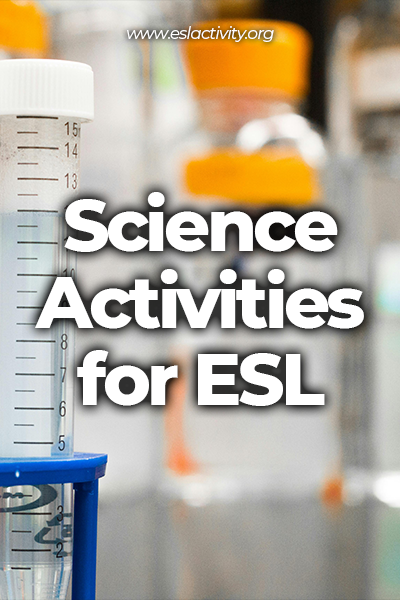
More Fun Games and Activities
If you are looking for more fun and educational games and activities for your ESL classroom, check out the following:
- Passive Games and Activities
- Reported Speech Games, Activities, Worksheets and Lesson Plans
- ESL Writing Activities, Games, Worksheets & Lesson Plans
- ESL Drill Activities and Games
- ESL Number Games and Activities
Science Games for Kids: Join the Conversation
Which ESL science game or activity is your favorite? Let us know in the comments! We’d love to hear from you.

